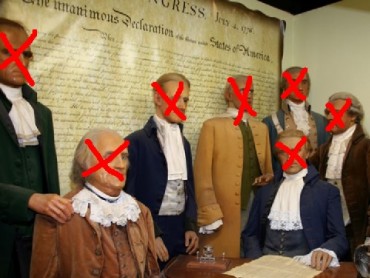
Fifty-five college professors have signed an open letter in opposition to the College Board’s controversial new framework for Advanced Placement U.S. history classes, expressing frustration with what they call an “arid, fragmentary, and misleading account of American history” that “shortchanges students.”
The course framework has been under fire from professors and history teachers alike since last summer, when it was first introduced. Now, after a year of the new framework’s implementation, criticisms continue to mount.
AP U.S. History is a college-prep high school class that students expecting to attend a four-year university often take, but “the teaching of American history in our schools faces a grave new risk,” the professors’ letter states. “Half a million students each year take the Advanced Placement exam in U.S. History. The framework for that exam has been dramatically changed, in ways certain to have negative consequences.”
“The new framework is so populated with examples of American history as the conflict between social groups, and so inattentive to the sources of national unity and cohesion, that it is hard to see how students will gain any coherent idea of what those sources might be. This does them, and us, an immense disservice,” the scholars wrote in a recent letter that is being given logistical support by the National Association of Scholars.
One of the letter’s signatories, Susan Hanssen, told The College Fix she wishes more universities would step up to refuse AP credit. Hanssen, an associate professor of history at the University of Dallas, says the framework emphasizes the “failures” of the Constitution, proving its shortsightedness.
“The framers of the American Constitution would be appalled to hear U.S. high schoolers taught that they had founded a ‘modern mass democracy,’” she said, adding the framework “leaves American history out in the cold.”
Critics first raised concerns last August, when conservative intellectuals said the framework revisions ignored the Founding Fathers and the heroics of World War II while focusing too much on identity politics and promoting a “particular interpretation” of the nation’s history.
They pointed out “seminal documents” missing from the new framework include: the Mayflower Compact; Northwest Ordinance; Federalist Paper No. 10; Frederick Douglass’s Independence Day speech; Alexis de Tocqueville—excerpts from Democracy in America; Lincoln’s Gettysburg Address; John F. Kennedy’s inaugural address; and Dr. Martin Luther King Jr.’s “I Have a Dream” speech.
But other scholars pushed back against the critics at the time, dismissing their concerns altogether. They said there was absolutely no hint of political or ideological bias in the new framework, adding teachers can deviate from it if they so choose.
The goal, according to the framework’s defenders, was to give teachers the flexibility to “populate the course with content that is meaningful to them and that satisfies their state mandates.”
Nonsense, said NAS President Peter Wood, who lambasted the “radical” revisions in a preliminary report last summer.
“The College Board has turned AP U.S. History into a briefing document on progressive and leftist views of the American past,” he wrote at the time. “It is something that weaves together a vaguely Marxist or at least materialist reading of the key events with the whole litany of identity group grievances.”
Wood did not sign the new letter, telling The College Fix it was meant to be from historians. “I’m an anthropologist,” he said.
No one historian or professor took the lead to author the letter, Wood noted, because they wanted to make it a “genuinely joint statement.”
“They decided they wanted to speak in a collective voice rather than be identified as having taken the lead,” he added. “I’m respecting their decision.”
Harvey Klehr, a politics and history professor at Emory University who also endorsed the letter, told The College Fix he had reservations about the framework from the beginning – as did Robert Paquette of Hamilton College, who outlined his criticisms in an op-ed for NAS earlier this year.
Meanwhile, the College Board has said it plans on conducting a summer 2015 review of the new framework, in an effort to “clarify and encourage a balanced approach to the teaching” of the course. A spokesman directed The College Fix to a Wall Street Journal letter to the editor written by College Board’s Senior Vice President Trevor Packer.
“While there has been a great deal of misinformation and misunderstanding about the current AP U.S. History course framework, there has also been principled and thoughtful feedback,” Packer wrote, adding he is confident the College Board will resolve the critics’ concerns.
Another of the letter’s signatories, history Professor Bill Miscamble of the University of Notre Dame, told The College Fix he hopes the revision of the framework will address the contentions in the letter.
“The fact that the Board is planning a revision is perhaps some cause for encouragement but we shall have to wait to see what emerges,” he said.
Klehr concurred with Miscamble, saying he will “contain [his] enthusiasm” until he sees whether any substantive changes are made.
College Fix reporter Andrew Desiderio is a student at The George Washington University.
Like The College Fix on Facebook / Follow us on Twitter




Please join the conversation about our stories on Facebook, Twitter, Instagram, Reddit, MeWe, Rumble, Gab, Minds and Gettr.